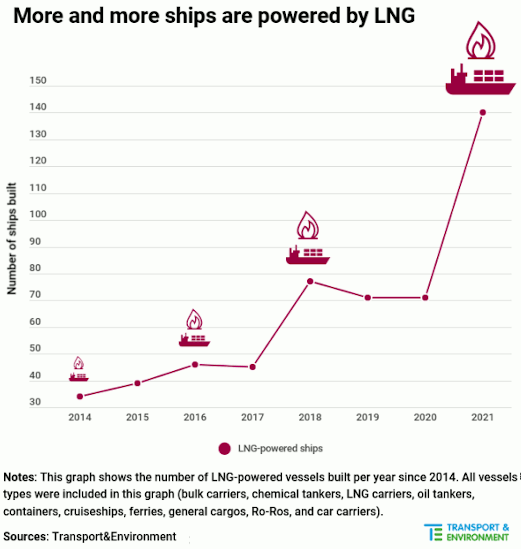
In 2030, shipping in Europe will have to be able to rely on more than 6.3 million tonnes of liquefied natural gas to supply its growing fleet of ships powered by this source of energy. It highlights a study by the non-governmental organisation Transport & Environment (T&E) specifying that this volume of Gnl needed for shipping in Europe is equivalent to seven million gas-heated homes and denouncing that it is betting on the passing on liquefied natural gas for the decarbonisation of shipping is an irresponsible choice in the framework of the energy crisis that is going through Europe and will only increase its dependence on fossil fuels.
"While in Europe, families are struggling to pay their energy bills," said Constance Dijkstra, head of T&E's Gnl campaign-the maritime sector is looking for new ways to burn gas. It is estimated that by 2030 almost a quarter of European shipping could work at Gnl, at a time when we should be looking for solutions to reduce our dependence on fossil fuels. This must end. " Transport & Environment stressed that instead some political leaders and the shipping industry, which with air transport accounts for a significant share of carbon emissions, are pressing for liquefied natural gas to be used. is recognised as a "clean" alternative to conventional fuels while almost 80% per cent of the GNL currently used by European ships-it is in fact much worse for the climate than the fuels it replaces, in particular because of the release of methane, a powerful greenhouse gas.
According to T&E, European politicians should also be concerned about the impact of this trend on energy security. The study shows that more than 200mila households could receive the necessary gas for the fleet of LNG-fuelled ships, which will increase significantly since around a quarter by 2030. of the energy needs of maritime transport could be based on this technology.
For T&E, this is the moment to block the trend of increasing the use of liquefied natural gas as a naval fuel : today, the majority of Gnl-powered ships are dedicated to transporting this. gas, but in the future other types of ships will be increasingly fuelled at Gnl. If only seven GNL-powered container ships were built in 2018 in 2018, there were 171 container ships in GNL that were ordered around the world.
"With limited gas reserves and rising prices, it becomes very risky for shipping companies to turn to gas," Dijkstra said. It is also a bad solution for the climate. The EU should abandon its plans to promote fossil gas in maritime transport and benefit green fuels based on hydrogen. " 
